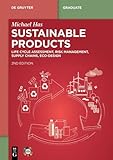Sustainable Products : Life Cycle Assessment, Risk Management, Supply Chains, Ecodesign / Michael Has.
Material type: TextSeries: De Gruyter TextbookPublisher: Berlin ; Boston : De Gruyter, [2024]Copyright date: 2024Edition: 2nd, Revised and Extended EditionDescription: 1 online resource (XII, 372 p.)Content type:
TextSeries: De Gruyter TextbookPublisher: Berlin ; Boston : De Gruyter, [2024]Copyright date: 2024Edition: 2nd, Revised and Extended EditionDescription: 1 online resource (XII, 372 p.)Content type: - 9783111314822
- 9783111315669
- 9783111315461
- Manufacturing processes -- Environmental aspects
- Product life cycle
- Sustainable development
- Nachhaltigkeit
- Risk Management
- Suppply Chain Mangement
- Ökobilanz
- BUSINESS & ECONOMICS / Development / Sustainable Development
- Eco-Design
- Life Cycle Assessment
- Risk Management
- Supply Chain Management
- Sustainability
- online - DeGruyter
- Issued also in print.
| Item type | Current library | Call number | URL | Status | Notes | Barcode | |
|---|---|---|---|---|---|---|---|
 eBook
eBook
|
Biblioteca "Angelicum" Pont. Univ. S.Tommaso d'Aquino Nuvola online | online - DeGruyter (Browse shelf(Opens below)) | Online access | Not for loan (Accesso limitato) | Accesso per gli utenti autorizzati / Access for authorized users | (dgr)9783111315461 |
Frontmatter -- Foreword -- Literature -- Contents -- Chapter 1 Historical development and basic ideas -- Chapter 2 Economic concepts in the context of sustainability -- Chapter 3 Business and sustainability -- Chapter 4 Life Cycle Assessment (LCA) and footprints -- Chapter 5 CO2 footprint: assessment, calculation, reduction -- Chapter 6 Ecodesign -- Chapter 7 Life cycle assessment of an organisation -- Chapter 8 Energy and material strategy -- Chapter 9 Internal stakeholders -- Chapter 10 Audits -- Chapter 11 Reporting, legal requirements and risk assessment -- Chapter 12 Information and transparency -- Chapter 13 Perspectives -- Annex 1 – Sources -- Annex 2 – List of tables -- Annex 3 – List of figures -- Annex 4 – Biography -- Index
restricted access online access with authorization star
http://purl.org/coar/access_right/c_16ec
The book provides an overarching perspective on sustainability from a historical, practical and legal perspective. It offers a holistic understanding of economic and ecologic concepts. Schools for sustainable business models are introduced and discussed. As a broader concept Life Cycle Assessments are discussed and examples for their application are provided with a focus on CO2 Footprints. Ecodesign as measures for reducing Carbon Footprints are introduced both for physical products and for service organizations. From an organizational perspective it is clear that managing the reduction of the sustainability-related impact is a matter that has to involve all stakeholders. Tasks for all involved are given and their contributions are described. As it is crucial to provide evidence for the activities reported audits are described as well methods to transfer information to the appropriate stakeholders. The book is targeted at practitioners and students who want to get to know the subject or need to implement the respective measures in companies.
Issued also in print.
Mode of access: Internet via World Wide Web.
In English.
Description based on online resource; title from PDF title page (publisher's Web site, viewed 20. Nov 2024)


